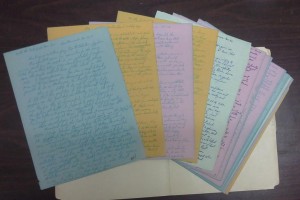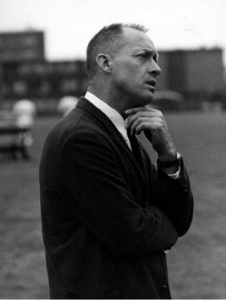“It is difficult to express one’s appreciation for the many generous assists from the people in our great state of Oregon — I take this method, telling of my observations of the places seen, the people met, and some of the ‘inside’ on the 1956 Olympic games.”
— Bill Bowerman, San Francisco, November 18, 1956
So begins the first of 19 pages handwritten by Bill Bowerman to document his trip to Australia for the 1956 Melbourne Olympics. This collection was recently rediscovered in the University Archives while processing correspondence and other papers from various University of Oregon coaches from the post-war period of the 1950s and 1960s.
The first two pages of the journal detail the journey to Australia, as Bowerman reflected on recent events in track and field while waiting for fog to clear in San Francisco and again during his time in the air between Canton Island and Fiji. His initial thoughts reveal frustrations with the aid scandals that had begun to emerge in the Pacific Coast Conference, the challenges of trans-Pacific travel during the era, and observations about the stops along the journey.
When Bowerman arrives in Melbourne, his first recollections detail his meeting with Jim Bailey, the Australian runner who, while racing earlier that year for the University of Oregon, became the first person to run the mile in under four minutes on American soil during a dual meet in Los Angeles. Bowerman notes that Bailey had been running with an injured foot during the Olympics — as well as the cold reception Bailey had received from many Australians for defeating world-record holder and compatriot John Landy during that dual meet.
Bowerman, retelling Bailey’s tale, states that the spectators in Melbourne “stood and payed [sic] their respects to the man from Sydney by booing the hell out of him. This was not Australian against Australian, it was Melbourne against Sydney… and Jim was getting the treatment.”
Within the journal pages we also learn that the “American team has a sort of calm confidence that is inspiring to see.” Bowerman’s assessment would prove prophetic, as American men captured 15 of the 24 gold medals offered in track and field. That success, however, did not extend to 21-year-old Bill Dellinger in the 5000m race. Bowerman took personal responsibility for the loss, writing on November 29 that “I am most regretful that Bill Dellinger had to suffer because of my incompetence.”
Not everything within the journal pages reflected solely on the Olympic competition, however. Bowerman relates a humorous anecdote about dining out at the Savoy Plaza:
“When the main course came, there were some delicious looking garden peas. I ate only one bite of mine… there was a more than noticeable taste of double mint, and I could only assume the cook had dropped his gum. Well, last night it was chow at the Australia Hotel and again peas. Yes, you guessed it, peas tasted like mint. Now the assumption is that they like mint in their peas, or again there might be two careless cooks.”
He also commented on the dearth of Oregon newspaper reporters at the Olympics, recognizing that “they are qualified to report such a wonderful event” and that “it would give them a keener appreciation of track and field and its place in the athletic world.” Bowerman then implores the owners and editors of Oregon media outlets to “establish in their budgets an item called Olympic games coverage.”

The pages of Bowerman’s 1956 Olympic journal (Coaches’ collection, Box 30, in Department of Intercollegiate Athletics records, UA 196)
The last pages afford Bowerman the opportunity to reflect back on the track and field competition from Sydney, as he relaxed in Australia’s largest city prior to his journey home. During his time in Sydney, he was able to attend Bailey’s wedding — after being dragged fishing at 4 am by a taxi driver the morning of the ceremony.
The journal entries end on December 9, as Bowerman touched back down on American soil in Hawaii. “I intended staying a full week,” he reflected in his final dispatch, “but with Barbara, my bride of 20 spring times, not being able to get away from our grade school youngsters, I’m going to get back to Oregon as soon as I can get space.”
In the end, Bowerman’s 1956 Olympic journal provides insights into the mindset of the young coach, who had taken over as Oregon’s head track coach less than a decade earlier. The journal reveals how this journey provided a seminal experience that would reflect in Bowerman’s coaching philosophy throughout the rest of his life.
Information for this article was collected from the following sources:
- Coaches Papers, Box 30, in Department of Intercollegiate Athletics records, UA 196, Special Collections & University Archives, University of Oregon Libraries, Eugene, Oregon.
- “Melbourne/Stockholm 1956: Athletics,” Olympic.org, accessed September 25, 2015, http://www.olympic.org/content/results-and-medalists/gamesandsportsummary/?sport=32588&games=1956%2F1&event=.
Zach Bigalke
Student Research Assistant


